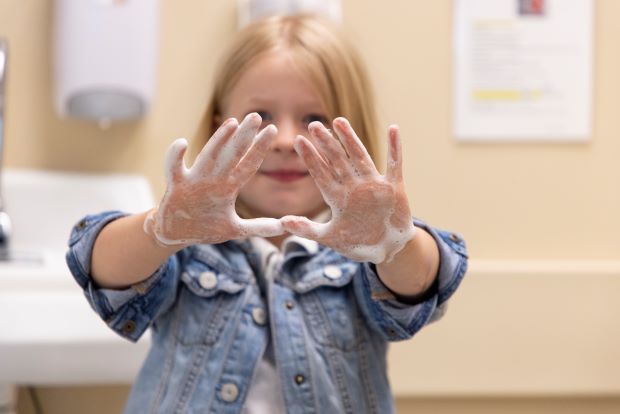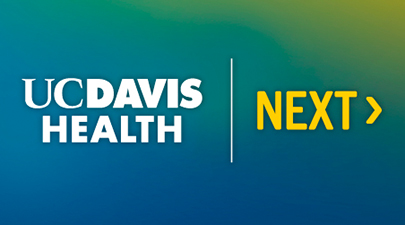Q&A: Hand Hygiene at UC Davis Health
Hand hygiene includes washing hands with soap and water or using hand sanitizer and is critical in preventing the spread of disease-causing microorganisms.
Elizabeth Partridge is an associate professor in the Department of Pediatric Infection Diseases. She answers questions about hand hygiene and how all employees can help improve hand hygiene at UC Davis Health.
Why is hand hygiene so important?
You can’t see them, but our bodies are covered with microorganisms or germs. Our hands are highly colonized with organisms we pick up from touching each other, our patients and our environment.
Poor hand hygiene is associated with higher rates of device-related infections, surgical site infections and hospital-acquired C. diff infections.
We see evidence of poor hand hygiene every time there’s a cluster of patients or employees with norovirus, influenza or COVID-19.
What’s the big deal about hand hygiene? Why is May 2025 Hand Hygiene Month at UC Davis Health?
Hand hygiene is fundamental and yet we don’t do it consistently.
We can all improve our hand hygiene practices.
On May 5, the World Health Organization (WHO) celebrates World Hand Hygiene Day.
Starting this year, UC Davis Health will highlight the importance of hand hygiene each May.
Why don’t people just wash their hands?
We get busy and forget. Or it’s inconvenient. I’ve heard, “I can’t find the gel dispensers in this place!” or “Seriously, you want me to find a sink and wash my hands before and after every patient I see? I’ll never finish my rounds!” or “I see a patient every 5 minutes, you expect me to clean my hands every 5 minutes? I won’t have any skin left!”
How do you respond to those comments?
Yes, it’s inconvenient, but it’s important. It’s really important.
You know it’s important because if that was your child or your loved one in that hospital bed, you’d want the health care provider to wash their hands.

What are the “5 Myths about Hand Hygiene at UC Davis Health?”
- There is no problem with hand hygiene at UC Davis Health.
- I don’t need to perform hand hygiene because I don’t plan on touching the patient.
- I don’t have to practice hand hygiene if I don gloves upon entering a patient room.
- It is rude to point out when someone has forgotten to perform hand hygiene.
- UC Davis Health doesn’t need my help to improve hand hygiene.
This messaging is aimed at clinicians. These are the myths we tell ourselves and each other about hand hygiene. Myths like, “Hand hygiene is not a problem here at UC Davis Health.”
As an infectious disease physician, I can tell you with certainty it is a problem, and it’s making our patients sick.
To be clear, if we don’t wash our hands, we will transmit germs that can make our patients sicker.
Why is it important that everyone entering a patient room clean their hands before entering, even those who are not planning on touching patients?
The bottom line is that you may need to, decide to, or inadvertently touch a patient or the patient’s environment. What if you get tired and lean up against the bedrail?
Every time you touch something without cleaning your hands first, you increase the bioburden in that space. I recommend performing hand hygiene on entry and exit of every patient space. Make it part of your routine, part of your muscle memory as you move within the hospital.
Do you really expect trainees to remind their supervisors to wash their hands? Is that realistic?
Is it hard? Yes. Can it be awkward? Yes. Is it an important patient safety issue? Yes. That is the culture of safety that we want here at UC Davis Health.
It’s possible to remind each other in a respectful and friendly way, to do hand hygiene. “Oh, you missed the hand hygiene dispenser Dr. X, it’s right here.”
Or “Dr. Y, can I point you toward the hand hygiene dispenser or sink before you put on those gloves?” or “Just a friendly reminder to do hand hygiene when you enter the room.”
The response to these reminders should be a resounding, “thank you” because we all need help keeping our patients and each other safe.
What do you hope health care providers take away from Hand Hygiene Month?
I’d like to ask for help. Please help raise hand hygiene awareness. Brainstorm ways to improve hand hygiene within your medical teams and departments.
Model hand hygiene for your trainees and colleagues. Respectfully remind each other to do hand hygiene and respond kindly when someone reminds you.
Performing hand hygiene when you enter a room signals to patients and families that we prioritize safety and inspires confidence in the lifesaving care that we provide.





